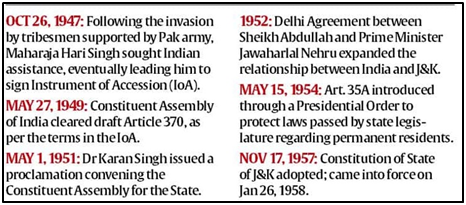Why in news?
- The Supreme Court in a 5-0 unanimous ruling upheld the Centre’s abrogation of Article 370 of the Constitution.
What’s in today’s article?
- Article 370
- Abrogation of Article 370
- News Summary
Article 370
- About
- Article 370 is the first article of Part XXI of the Constitution - ‘Temporary, Transitional and Special Provisions’.
- It exempts J&K from the application of the Constitution of India (except Article 1 and Article 370 itself) and permits the state to draft its own Constitution.
- It restricts Parliament’s legislative powers in respect of J&K and for extending a central law on subjects included in the Instrument of Accession (IoA), mere “consultation” with the state government is needed.
- Timeline
Abrogation of Article 370
- On 5 August 2019, the Indian government revoked nearly all of Article 370 of the Indian constitution.
- On August 5th, the President issued The Constitution (Application to Jammu And Kashmir) Order, 2019.
- This order replaced the term ‘Constituent Assembly’ from Article 370(3) with ‘Legislative Assembly [of Jammu & Kashmir]’.
- The Order technically amended the interpretation clause Article 367, not Article 370 itself (it used Article 370(1) to do so).
- Later, a Statutory Resolution was introduced in the Rajya Sabha that abrogated most of Article 370.
- This was possible without the Jammu & Kashmir Legislative Assembly’s concurrence because the State was under President’s rule.
- On 6 August, Parliament passed the Jammu and Kashmir Reorganisation Bill, 2019 that bifurcates the State into two Union Territories: Jammu & Kashmir and Ladakh.
- The former is provided with a legislative assembly.
Background of the current judgement
- Multiple petitions were filed after the abrogation of Article 370.
- On 28 August 2019, the SC agreed to hear multiple petitions challenging the abrogation of Article 370 and the subsequent bifurcation of J&K into two UTs.
- It constituted a five-judge bench for the same.
News Summary: Article 370 abrogation upheld
- The Supreme Court gave its verdict on the Union government’s 2019 move to amend Article 370 of the Constitution.
- The abrogation ended the special status conferred to the erstwhile state of Jammu and Kashmir.
- The court held the Constitutional order that revoked Article 370 as valid.
Key highlights of the judgement
- On the ‘unique’ and ‘special status’ of Jammu and Kashmir
- The SC held that J&K did not retain any element of sovereignty after its accession to India in 1947.
- The court said that although Maharaja Hari Singh, the erstwhile ruler of the princely state, issued a proclamation that he would retain his sovereignty.
- However, his successor Karan Singh issued another proclamation that the Indian Constitution would prevail over all other laws in the state.
- On 25 November 1949, a Proclamation was issued for the State of Jammu and Kashmir by Yuvraj Karan Singh.
- It stated that the Government of India Act, 1935, which until then governed the constitutional relationship between J&K and the dominion of India, will stand repealed.
- It further stated that the Constitution of India shortly to be adopted by the Constituent Assembly of India shall be applicable to J&K.
- This in essence, had the effect of a merger like every other princely state that joined India, the court ruled.
- Jammu and Kashmir has always been an integral part of India
- CJI Chandrachud cited Section 3 of the J&K Constitution itself, apart from Article 1 and 370 of the Indian Constitution.
- Article 3 of the J&K Constitution reads: “The State of Jammu and Kashmir is and shall be an integral part of the Union of India.”
- Being the only state with its own Constitution also does not define a special status.
- The purpose of J&K Constitution was to ensure everyday governance in the state and the purpose of Article 370 was to integrate the state with India.
- On restoration of statehood
- The court said the reorganisation of the erstwhile state into Union Territories in 2019 was a temporary move.
- Hence, it directed the Centre for the restoration of statehood and for Legislative Assembly elections to be held.
- Article 370 - a temporary or a permanent provision
- The Supreme Court held that Article 370 is a temporary, transitional provision.
- The court said that the temporary provision served a purpose in the war-like situation prevailing in the state in 1947.
- On the questions relating to the effective abrogation of Article 370
- The Supreme Court upheld both the presidential proclamations of August 2019.
- The court was to decide on the legality of the two Presidential proclamations in 2019 which in effect abrogated Article 370.
- The Court upheld both the proclamations, including the one that gave a new meaning to “constituent assembly of Jammu and Kashmir”, as “Legislative Assembly of Jammu and Kashmir.”
- The central issue was whether these actions could be taken by the Union assuming powers of the state when it is under President’s rule.
- Here, the Supreme Court referred to the landmark 1994 ruling in ‘SR Bommai v Union of India’.
- This case dealt with the powers and limitations of the Governor under President’s rule.
- In the Bommai case, SC held that the Governor can assume “all or any” roles of the state legislature.
- Relying on an interpretation of the Bommai ruling, the SC said that there is no prima facie case that the President’s orders were malafide or extraneous exercise of power.
- Truth and Reconciliation Commission
- Justice Sanjay Kaul, in his opinion, recommended setting up a Truth and Reconciliation Commission to look into alleged violations of human rights by both state and non-state actors in J&K.
- The commission is an official mechanism to not just acknowledge, but also reveal, wrongdoings by a government so that conflicts of the past can be addressed and resolved.










